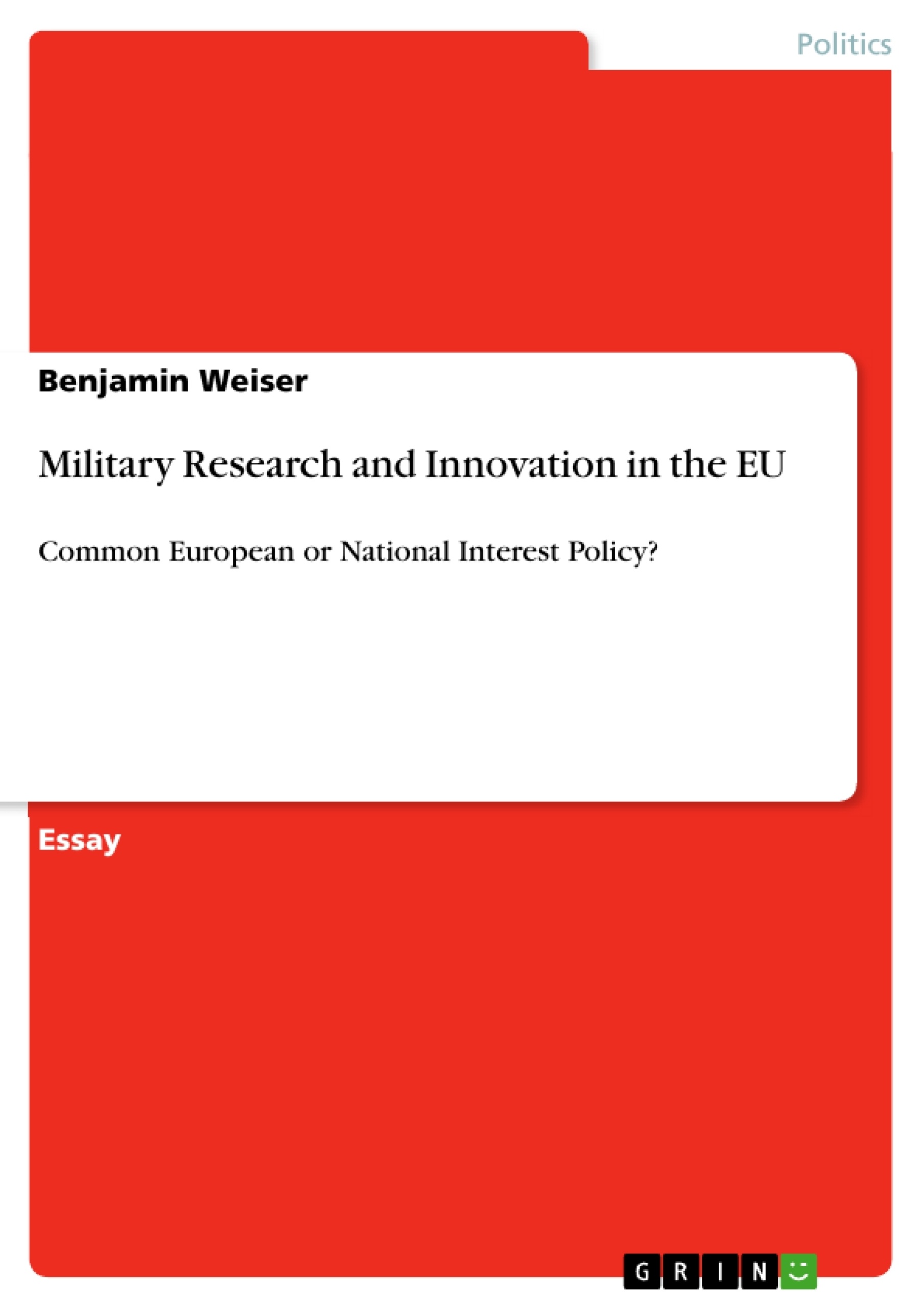Excerpt
INDEX
1. Introduction ... 3
2. National interests and cooperation in military S&T: The cases of UK and Germany ... 4
3. Does being rational mean being national? ... 7
4. Reference list ... 9
1. Introduction
This essay is an analysis on the role of national interests in military research and innovation policies of UK and Germany. As this two cases have the charm of being both very important European countries and members of the European Union, but with different policy strategies at the European level, there is a significant scientific interest in researching their approaches. Especially in the sensitive field of military research and innovation one can see a complex situation. On the one hand, the rationality of sharing data in terms of fiscal and budgetary restrictions is seen as a political fact that can‘t be ignored by now (see Dunne and Braddon 2008). On the other hand, national traditions and inward-looking interests are not yet a relic of the past. This leads to the following research question: Which role do national interests play in military research and innovation policies of UK and Germany? Out of this question I develop two hypotheses, which are based on the Neorealist theory paradigm. I suggest that UK‘s military science and technology (S&T)-strategy serves individual national interests rather than common European interests. The various forms of cooperation underlie a rational cost-benefit calculation, while a stronger military role of the European Union as an actor itself is seen critical. In the case of Germany I mention that the country’s S&T-strategy has a strong European orientation because of fiscal restrictions and the risk of losing strategic importance without institutional integration. This genuine European approach can be seen as an expression of the Neorealist behavioural patterns as “rational egoists” (see Shaver 2009 and Gilpin 1996). The basic assumptions of the chosen theoretical approach are the dominance of national interest policies and anarchy between nation states. Under the conditions of anarchy and uncertainty, states will only collaborate if an (institutional) cooperation is likely to bring a relative benefit and better power position than without collaboration (Frankel 1996). Therefore, European cooperation in the field of military S&T is no self-purpose. I try to reveal other main theoretical key points, like the role of international organizations, in the empirical part of the essay when arguing for or against the hypotheses and scanning the empirical findings through the theory’s lens. To avoid the risk of the theory’s determination of results I will make some Institutionalist interjections. The methodology concentrates on comparing different strategy papers and other secondary material from experts with focus on the relevance of individual or common interests in military S&T policies. Normally the Neorealist paradigm would indicate a quantitative analysis, but in the given frame of 7 pages it is not possible to go into detailed quantitative data analysis. Moreover, there is a general risk of using quantitative data in the field of military S&T. As Björn Hagelin mentions: “The financial value of military support of S&T is generally low, especially when compared to traditional military R&D expenditure. The question is relevant only if the assumption is that high expenditures equal high military returns and low expenditures equal low military returns. In fact, in the area of S&T-based military innovation the potential military net returns may be high exactly because expenditures are low. It has been estimated that the British MOD receives at least a 5:1 return on its investment in joint research programmes.” (Hagelin 2014, p.302; see also British Ministry of Defence 2001). Therefore, the conceptualization focuses on interpreting secondary material by concentrating and comparing on the results they reveal. Besides these and general measurement restrictions, when asking about (national) interests – nobody can fully put him-or herself in the position of someone other – it is overall possible to draw tendencies of the two states’ policies. The time frame is generally limited from the 9/11 attacks, seen as a game changer in responsiveness to asymmetric or other threats, until the latest developments (Hagelin 2014, p.285). Yet the found references are dated around the last years. Earlier sources will round up the line of argument.
[...]
- Quote paper
- B.A. Benjamin Weiser (Author), 2016, Military Research and Innovation in the EU, Munich, GRIN Verlag, https://www.grin.com/document/317191
Publish now - it's free






















Comments